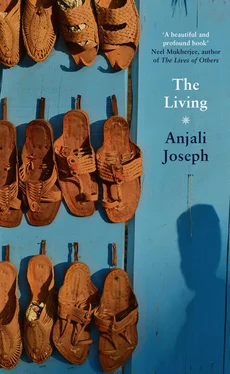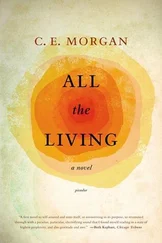But I always feel you want me to be better, I said.
What do you mean?
That you expect more from me, I said. Again, I felt idiotic.
She looked at me. I just think sometimes you make too much work for yourself, she said, being the way you are.
*
When I came in she said, Look who’s come to see you.
Arre, I said. Standing there, diffident and friendly as ever, it was the young malik.
He brightened. He’s been coming here since he was a teenager. Now he’s not a boy, but a married man, a father of two, and it’s he who looks after most of the business.
You’ve eaten? he said. I’m not disturbing you?
Have you eaten?
I just came from home. I thought I’ll come and see you for some time on my way to the shop.
Their house isn’t so far from ours, on the main road. A much bigger house, of course. The old man built it, and they all live there.
Have some tea, I said.
No, nothing, he said.
No, this time have some tea, I said.
She went to make it.
Do you need to sit down? he asked. Rest?
I’ve been resting too much, I said. I’m bored. I miss work. As I said it I realised it was true. I don’t remember ever not working for this long. I think I’m ready to start again, I added.
The young malik sat on the floor with me. I sat in my place, despite not working. My right foot found its way to the anvil stone, and pushed against it, reassured by the old resistance.
She came in with the tea. The young malik gave her a big smile and stood to take the cup. He used to come and spend time with us much earlier, when he was learning the trade. His father taught him the basics, but then he came to watch me, also, I think because we accepted him as he was, never expected anything from him.
How are the children? I asked.
He beamed. Avantika is going to learn Chinese in school, he said.
Chinese! I said.
He laughed. It’s the language of the future, he said. She knows how to say her name, to say she’s an Indian.
That’ll be useful, I said, in the future.
He laughed. She can do business in China.
Maybe in the future we’ll all be speaking Chinese, I said. Not me, of course, I’ll be dead. But you, and everyone else.
I don’t know if there’ll be chappals in the future, our chappals.
No one will need them, I said. Maybe the indoor chappals. Every surface will be smooth and clean.
He laughed again. Air-conditioned, he said.
Air-conditioned, I said. His children’s school, which they go to in a bus every morning, is air-conditioned, a big white building on the road out of town, a more fancy version of Rohan and Sohan’s school in Pune.
He dropped his head, looked at his feet. His hair is always neatly stuck down and combed behind his ears, which stick out — lucky ears, Ganpati ears.
I wonder, he said, how long things can go on this way. This trade. After you’re gone, you and the other seniors, I’ll get machines. There’ll be no more of this, making by hand.
He often talks about it.
I can’t imagine it, I said. But then I didn’t imagine the life my grandchildren lead. My father used to do this work. I gestured at the anvil stone. And my grandfather, how many generations, who knows.
When it’s gone, he said, it’ll just be gone, it’ll be as though it never had been there.
He finished the tea and picked up the cup, stood to take it to the kitchen. You look better than I thought, he said.
*
I want to work, I said in the evening. Nothing’s any good without it.
Yes, she said. You’ll be better when there’s work again.
I said, What I said earlier — I’m ill.
She was changing into the gown she sleeps in.
I didn’t mean it, I said. I sat on the end of the bed.
No? she said. She smiled.
Well, I said. I mean — Oh. Why do you always do this?
Do what?
She lay down next to me. Is there any point in going into it all now? she said.
I don’t know, I said. Maybe not.
I know, she said. You like to talk.
I fell asleep, and it was only a moment later, when it was starting to be light and I heard the stove, and water boiling, that I realised it was morning and I hadn’t woken during the night.
*
Two days before Diwali, I came down with a cold. The afternoons smelled of woodsmoke now; in the morning, the air had a bite. I was tired all the time. In the evening, instead of taking my walk, I found myself sitting on the end of the bed. I’ll just lie down for a minute, I said. I fell asleep and woke before dawn with a dry mouth.
I didn’t work much that day. Preparations were going on for Diwali. She made karanji, chivda, and chakli. I worked for some time, then slept, then worked. I finished a pair. But I felt disconnected. I was so tired.
One is always going to die, from the moment of having been born, but at certain occasions it seems more imminent. I see you coming and going, said the old man, a messenger from the future.
The next night, with the noise and the crackers, I slept badly. I woke shivering and fragile. It was the hinge between one year and the next. What would another twelve months bring? Even the idea was exhausting. Was it the acceptance of my death, at some time in the future, not as an abstract idea but a fact, an illness, a loss of control, then death itself, that made me feel like this? Or something else — the loss of the man I might have been, the man I had always reserved the possibility of becoming?
She cried out from the other room, a cry I hadn’t heard in a long time.
What is it? I shouted. I sat up and she rushed in. There was something in her arms, something whitish and dirty.
Look! she said and then bending to the bundle, You’re back! He’s back.
I see that, I said. I went to her and took the cat from her. He settled down, resting his front paws on my shoulder as usual.
So you came back? I said. Green eyes looked wearily into mine. He yowled.
Get him some food, for God’s sake, I said. And what happened to you? I asked. You’re filthy. Are you hurt?
But when I put him down there didn’t seem to be any wounds. He was tired and bedraggled. She gave him milk and bhakri, then a fish head, and he ate it and began to wash himself.
He came back, she said. I knew he would. Her eyes shone.
I didn’t know, I said. I thought …
I knew, she said.
I patted her shoulder. I’m tired, I said. I didn’t get enough rest at night. I’ll sleep until lunch. But I put on the radio, quietly, so that I wouldn’t feel alone.
As soon as I got on the bed and arranged the blanket, I looked down to see green eyes examining me. He hesitated, then jumped lightly up, and stretched out next to my stomach. At once, he began to rumble; I felt the vibrations and his warmth at my abdomen, and relaxed, as though someone else had taken over responsibility for my existence.
It was no longer really morning, but not yet time for lunch. She was busy in the kitchen. I heard neighbours’ voices, car horns outside, the different traffic of a holiday, and film music. The clay lamp burned on the doorstep, and the rangoli was neat and pretty just outside, white and green and red patterns of chalk, slightly shaky here and there, though she does it well; its naivety and impermanence make it more beautiful.
It was Diwali, and every good thing was at hand. My wife was in the next room. There was food in the house. Later, we’d see my grandson. The long ago past, my parents, Suresh, the parijatak bush, the Narsoba temple in the cucumber field, the well, the house where I’d grown up, all were distant, like a fever dream. Yesterday’s fears and pain seemed like a story in the newspaper. And, for once, restlessness and the urge to move towards the next thing were quiet.
Читать дальше
Конец ознакомительного отрывка
Купить книгу











